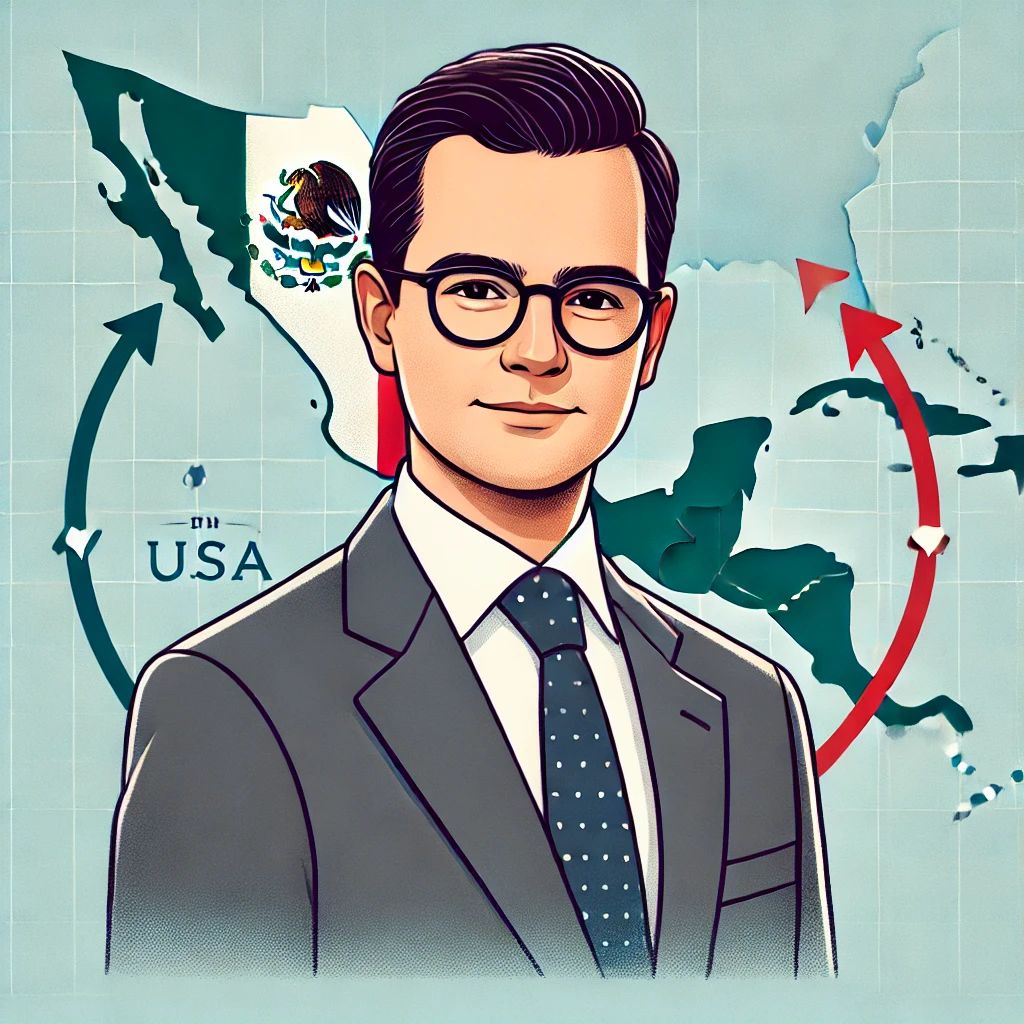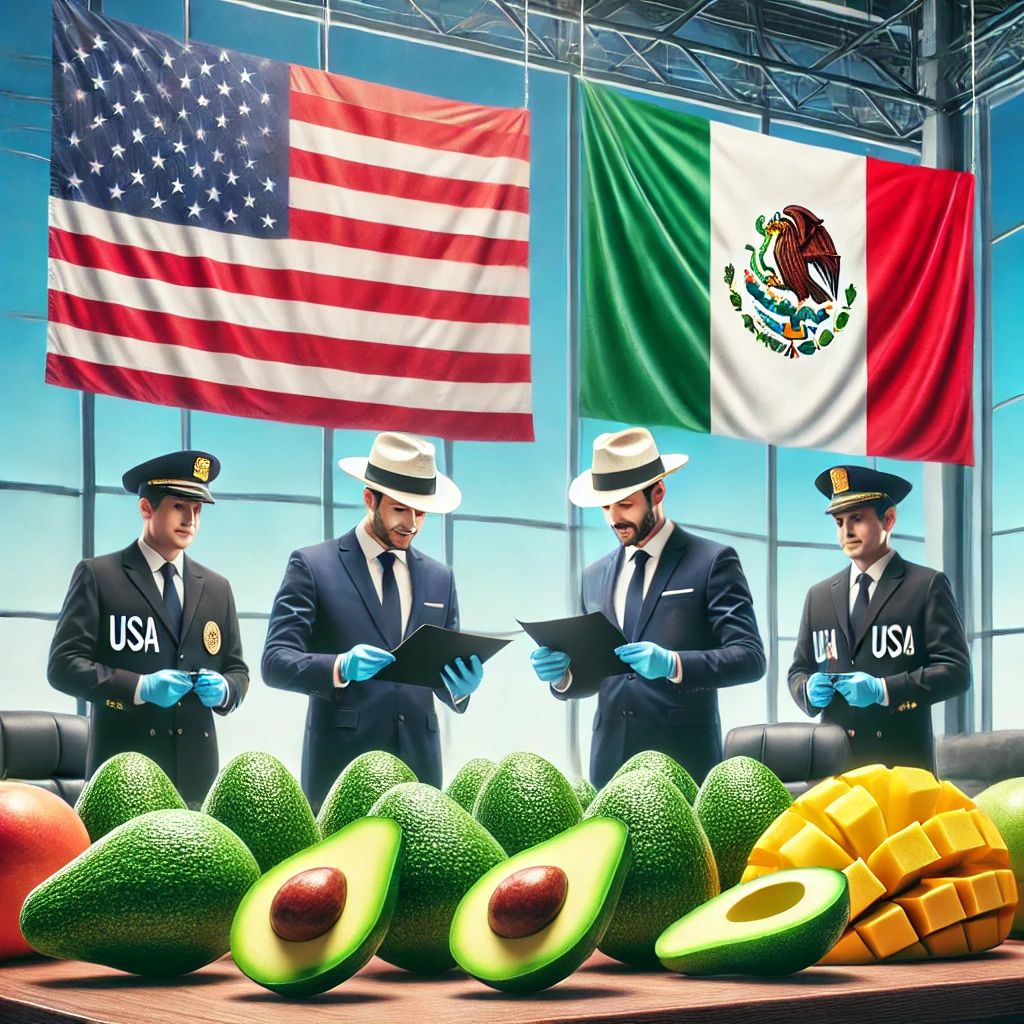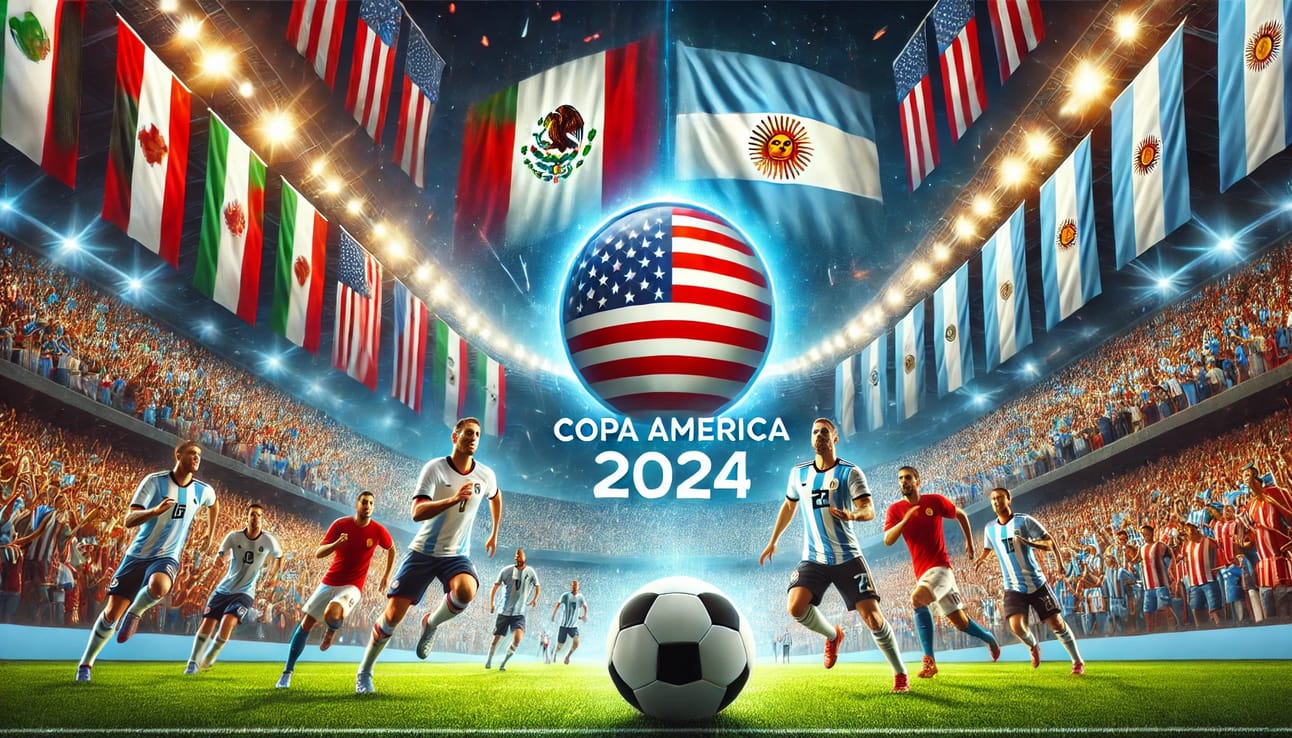What’s New This Week
{{Firstname|Good Morning}}, this week, we delve into the dynamic world of Latino politics, US-Mexico relations, and the cultural impact of sports. Discover how transformative trade policies and community resilience are shaping our future. Here’s what you’ll find inside:
🔊 Now, you can also listen to the highlights below, narrated by me! 👇🏽
Sections
The Quick Courier: Catch up on key political, trade, and security updates, including Biden and Trump clashing for Latino power, the first human case of H5N2 bird flu in Mexico, and a shocking political assassination wave.
Trade Winds: Marcelo Ebrard's Appointment and the Future of US-Mexico Trade - Analyzing the implications of Marcelo Ebrard's new role as Economy Minister and its impact on nearshoring and trade infrastructure.
Power Move: Ensuring Security for Economic Growth in US-Mexico Trade - Highlighting the recent avocado and mango inspections and the need for serious security measures to foster a stable trade environment.
The Playing Field: Copa America 2024 - A Confluence of Sports, Economics, and Culture - Exploring the significance of Copa America being hosted in the US and its economic and cultural impact.
The Border Buzz: The Rarámuri Running Women – A Symbol of Resilience and Cultural Pride - Celebrating the Rarámuri women's running achievements and their role in promoting cultural understanding and pride.
The Quick Courier
Politics
Biden and Trump Clash for Latino Power: As the 2024 election looms, Biden and Trump battle fiercely over the evolving Latino vote. Can Biden's policies outshine Trump's rhetoric, or will Trump's influence reign supreme? Dive into the drama
Hispanic Voters Backing Trump Amid Border Crisis: In a surprising twist, Hispanic voters are leaning towards Trump as frustrations over the border crisis grow. Will Biden's handling of immigration cost him crucial support Uncover the story
Seniors Swing Biden-Harris, But Trump Courts Latino and Black Voters: The Biden-Harris ticket gains traction with seniors, yet Trump makes inroads with Latino and Black communities. Can Trump's diverse appeal disrupt Biden's base? Explore the dynamics
Biden Campaign Taps Copa America to Woo Latino Voters: Leveraging the excitement of Copa America, Biden's campaign aims to connect with Latino voters. Will this sporty strategy score big in the polls? Find out more
Young Voters Juggle House Buying, Family, and Job Market Woes: A new poll reveals young voters' struggles with housing, family planning, and a tough job market. How will these challenges influence their votes in the upcoming elections? Learn more
Trade
2024 Elections: The Battle for Global Supply Chain Resilience: As the 2024 elections approach, the future of global supply chain resilience hangs in the balance. How will political outcomes shape the stability and efficiency of international trade? Discover the implications
MSC Expands Asia-Mexico Service Amid Growing Demand: With booming trade between Asia and Mexico, MSC is launching new services to meet the rising demand. How will this expansion impact global trade routes? Get the details
Mexico City Neighborhood Keeps Iconic Volkswagen Beetle Alive: In a nostalgic twist, a Mexico City neighborhood breathes new life into the classic Volkswagen Beetle. Discover the community's dedication to preserving this automotive icon. See the revival
Security and Migration
Mayor Murdered in Mexico Amid Politician Assassination Wave: A wave of political violence strikes Mexico, with the recent murder of a mayor in Guerrero highlighting the growing dangers. What does this mean for the nation's political stability? Read the full story
Mexico-Born NASCAR Driver Daniel Suárez Makes Waves: Daniel Suárez, Mexico-born NASCAR driver, is turning heads and making history on the racetrack. Can his success inspire a new generation of Latino athletes? Check out his journey
U.S.-Mexico-China Drug Money Trail Exposed: A shocking investigation uncovers the intricate drug money trail connecting the U.S., Mexico, and China. What does this mean for international efforts to combat narcotics trafficking? Unveil the network
First Human Case of H5N2 Bird Flu Claims Life in Mexico: In a dire health alert, Mexico reports its first human fatality from the H5N2 bird flu strain. How will this impact public health measures and regional safety? Read the alert
Trade Winds
Marcelo Ebrard's Appointment and the Future of US-Mexico Trade

Marcelo Ebrard - Mexico’s New Economy Minister
With President-elect Claudia Sheinbaum appointing Marcelo Ebrard as the new Economy Minister, US-Mexico economic relations are poised for a transformative phase. This is a pivotal moment, especially for those of us engaged in cross-border trade and economic development.
A Proven Leader
Marcelo Ebrard's extensive experience in international diplomacy and economic strategy positions him perfectly to navigate the complexities of our economic landscape. His tenure as Secretary of Foreign Affairs has equipped him with a profound understanding of the geopolitical dynamics essential for effective economic leadership.
Nearshoring: A Golden Opportunity
Nearshoring presents a significant opportunity for both nations. As the CEO of Intermestic Partners, I’ve seen how relocating supply chains closer to home can strengthen our economic ties and reduce logistical risks. Ebrard’s leadership will be crucial in making Mexico a prime destination for businesses seeking efficiency and proximity.
Modernizing Trade Infrastructure
Modernizing trade infrastructure is essential for robust trade relations. Improved customs processes and better transportation networks will enhance cross-border commerce. Ebrard has the vision and capability to drive these improvements, making Mexico more attractive as a trading partner.
USMCA: A Crucial Milestone
The upcoming USMCA review in 2026 is a significant opportunity. These talks will address emerging challenges and reinforce the agreement's benefits. Ebrard’s expertise in international relations will be vital in navigating these discussions effectively, ensuring the USMCA continues to foster beneficial trade relations.
Why Ebrard is the Right Choice
Ebrard’s diverse background and pragmatic approach make him an ideal choice for this role. His ability to build consensus and manage complex economic strategies will instill confidence in international investors and trading partners, strengthening Mexico’s economic position.
Conclusion
In my view, Marcelo Ebrard’s appointment as Economy Minister is a promising development for US-Mexico trade relations. With his proven leadership and strategic vision, Ebrard is well-positioned to guide Mexico through upcoming challenges and opportunities, shaping a prosperous economic future for both nations.
Power Move
Ensuring Security for Economic Growth in US-Mexico Trade
The recent halt and subsequent resumption of avocado and mango inspections between the US and Mexico highlight a critical issue that has long plagued our cross-border trade relations: security. As someone who has served as the Chief of Staff for U.S. Customs and Border Protection (CBP), I understand the complexities of ensuring safe and efficient trade. This incident underscores the urgent need for Mexico to adopt a serious security posture to mitigate uncertainties and foster a stable trade environment.

Joint US-Mexico Inspections
Security: The Linchpin of Trade
The pause in inspections created a ripple effect, disrupting supply chains and causing economic losses for both countries. Avocados and mangos are not just commodities; they represent a significant portion of Mexico's agricultural exports and are integral to the food industry in the United States. When security concerns lead to such interruptions, the economic impact is felt across the board—from farmers in Mexico to retailers in the US.
A Call for Serious Security Measures
For Mexico to maintain and expand its role as a key trading partner, especially with the growing trend of nearshoring, it must prioritize security. The US and Mexico have a history of cooperation on joint inspections and other security measures, but these efforts need to be intensified and expanded. A comprehensive security strategy that addresses the root causes of disruptions, such as crime and corruption, is essential.
Economic Impact and Future Potential
The economic stakes are high. Avocado and mango exports alone generate significant revenue and support thousands of jobs. If security concerns continue to cause disruptions, it undermines confidence in Mexico's ability to provide a stable trading environment. Conversely, if Mexico can demonstrate a commitment to security, it will not only stabilize current trade but also attract more businesses looking to nearshore their operations.
Competitive Advantage Over Asia
One of the key benefits of a secure and stable US-Mexico trade relationship is the competitive edge it can offer over Asian markets. Nearshoring presents an opportunity for North American businesses to reduce supply chain risks and costs associated with long-distance trade. However, this advantage can only be fully realized if security concerns are effectively managed. By working together, the US and Mexico can create a more attractive and reliable environment for businesses, enhancing our competitiveness on the global stage.
My Perspective
Drawing from my experience as CBP Chief of Staff, I have seen the positive outcomes that result from robust security measures and international cooperation. Joint inspections and collaborative security initiatives can significantly reduce risks and improve the efficiency of cross-border trade. However, these efforts require a sustained commitment from both nations.
In conclusion, the recent disruptions in avocado and mango inspections serve as a stark reminder of the critical role that security plays in our economic relationship. For Mexico to capitalize on the benefits of nearshoring and strengthen its trade ties with the US, it must prioritize security and work closely with its American counterparts. By doing so, we can create a more stable and prosperous future for both nations, enhancing our competitiveness and ensuring the smooth flow of goods across our borders.
The Playing Field
Copa America 2024 - A Confluence of Sports, Economics, and Culture
Copa America, the oldest international continental football (soccer) competition, is making a grand appearance in the United States this year. Traditionally hosted by South American countries, this prestigious tournament's move to the US represents a significant shift, bringing together a confluence of sports, economics, and culture.

Copa America 2024
What is Copa America?
Copa America, organized by the South American Football Confederation (CONMEBOL), features the best national teams from South America. This year's edition includes invited teams from North and Central America, adding to its prestige and competitive spirit. The tournament showcases footballing prowess and unites fans from diverse backgrounds, creating a melting pot of cultures and traditions.
How Did It End Up in the US?
The decision to host Copa America in the United States is driven by multiple factors. The US has proven its capability to host large-scale international sporting events, demonstrated by the successful hosting of the 1994 World Cup and the Copa America Centenario in 2016. Additionally, the US offers state-of-the-art stadiums, robust infrastructure, and a vast, enthusiastic fan base, making it an ideal venue for such a significant event.
Who is Playing?
This year's tournament features ten South American teams, including football giants like Brazil and Argentina, and six invited teams from North and Central America, including the USA and Mexico. This diverse lineup promises thrilling matches and showcases a variety of playing styles and strategies.
Economic Impact
Hosting Copa America in the US brings substantial economic benefits. The influx of fans from around the world boosts local economies through spending on tickets, accommodations, dining, and tourism. The tournament also provides a platform for sponsors and advertisers, generating significant revenue and fostering business opportunities. Moreover, the media coverage of the event enhances the global visibility of the host cities, potentially attracting future investments and tourism.
Favorites to Win
As the tournament progresses, several teams have emerged as favorites. Argentina, with its rich football history and a squad led by stars like Lionel Messi, is always a strong contender. Mexico, known for its passionate fan base and competitive spirit, is another team to watch. The USA, leveraging home advantage and a growing soccer culture, also has the potential to make a deep run in the tournament. These three teams, my personal favorites, embody the essence of Copa America—skill, passion, and the unifying power of sport.
Conclusion
Copa America 2024 in the United States is more than just a football tournament. It is a celebration of culture, economic opportunity, and international camaraderie. As we watch the matches unfold, we witness the intersection of sports and broader societal themes, underscoring the profound impact that such events have on our world. The tournament concludes on July 14, 2024, with the final being held at the Hard Rock Stadium in Miami Gardens, Florida.
The Border Buzz
The Rarámuri Running Women – A Symbol of Resilience and Cultural Pride
In the heart of Mexico's Sierra Madre mountains, the Rarámuri people, also known as the Tarahumara, have long been celebrated for their exceptional running abilities. Among them, the Rarámuri running women stand out not only for their athletic prowess but also for their embodiment of cultural resilience and pride. As we explore the intersections of culture and sport, their story offers a profound insight into how traditional practices and modern opportunities can coexist and enrich U.S.-Mexico relations.

Rarámuri Runners
Who Are the Rarámuri?
The Rarámuri are indigenous people living in the rugged terrain of the Copper Canyons in Chihuahua, Mexico. Renowned for their incredible endurance, they have developed a unique running culture that is deeply integrated into their daily lives and spiritual practices. Running is not just a sport but a way of life that connects them to their land, their ancestors, and their community.
The Legendary Running Women
The Rarámuri women, often seen running in traditional dresses and sandals made from recycled tires, have gained international recognition for their participation in ultra-marathons and other endurance events. Their attire, vibrant and flowing, represents a blend of cultural identity and practicality, allowing them to navigate the challenging landscapes of their homeland with ease.
Cultural Significance and Resilience
Running for the Rarámuri is more than a physical activity; it is a spiritual journey that fosters community ties and personal resilience. The women’s participation in global running events has brought attention to their culture, showcasing their strength and tenacity. This exposure has also highlighted the broader challenges faced by indigenous communities, such as land rights, economic hardships, and cultural preservation.
A Bridge Between Cultures
The international success of the Rarámuri running women serves as a cultural bridge, fostering understanding and appreciation between Mexico and the wider world, including the United States. Their story resonates with universal themes of perseverance and cultural pride, making them ambassadors of their heritage. Events like the New York City Marathon and the Ultra Maratón Caballo Blanco in Mexico have become platforms where Rarámuri runners inspire and engage with diverse audiences.
Participation in international events has opened new economic opportunities for the Rarámuri, providing sponsorships and support that benefit their communities. These opportunities help fund local initiatives, promote education, and support cultural projects. Furthermore, the media coverage of their achievements raises awareness about the importance of preserving indigenous cultures and traditions.
Conclusion
The Rarámuri running women are a testament to the enduring spirit of indigenous cultures and their ability to thrive in the modern world while maintaining their traditions. Their story enriches the narrative of U.S.-Mexico relations, illustrating how cultural exchanges through sports can promote mutual respect and understanding. As we continue to celebrate and support these remarkable athletes, we honor the broader cultural connections that bind our two nations.
Power Poll
What would you like to see more of in this newsletter?
Join the Conversation
Thanks for reading this edition of my newsletter! I'd love to hear from you. Share your thoughts about what you think are the most critical issues that need to be addressed. Email me at [email protected] or connect with me on social media using the hashtag #Intermestic.
Stay Informed, Stay Connected!
Subscribe to my blog at www.marcolopez.com.
Follow me on X, LinkedIn, and Facebook for the latest news and updates.
Share this newsletter with your network and help spread the word!
Let's keep the conversation going!